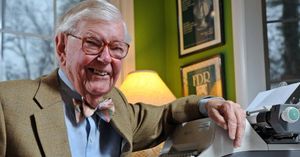Federico Mayor Zaragoza, the former Spanish Minister of Education and renowned director general of UNESCO, has passed away at the age of 90. His death was confirmed on Thursday by the University of Granada, where he previously served as rector. Born in 1934 in Barcelona, Mayor Zaragoza was one of the most prominent figures representing Spain on the international stage during the late 20th century.
Throughout his extensive career, Mayor Zaragoza held numerous significant positions, including serving as Minister of Education and Science under Prime Minister Leopoldo Calvo-Sotelo from 1981 to 1982. He was also deputy for the UCD during the constituent legislature and later elected to the European Parliament as part of the CDS.
Upon hearing the news, Audrey Azoulay, the current director general of UNESCO, praised Mayor Zaragoza’s legacy, highlighting his commitment to peace and education. “He prioritized the culture of peace, guiding the action of our organization for education on human rights and conflict prevention,” said Azoulay, underscoring the impact of his 12-year tenure leading UNESCO.
Pedro Mercado, the current rector of the University of Granada, expressed his condolences, stating, “It is an honor and satisfaction to recall the role he played as rector at very significant moments for our university's history. He was an intellectual, and scientist of great stature who always shone for his defense of education and values such as peace and human rights.” Mercado emphasized the pride of having worked alongside such a distinguished figure.
Mayor Zaragoza's career was marked not only by his contributions to education but also his significant impact on public health. During his time at the University of Granada, he was instrumental in initiating newborn screening tests, which have become a standard part of Spain's healthcare system. Javier Padilla, Secretary of State for Health, recognized him as “one of the persons who worked the hardest to promote neonatal screening in our country.”
His legacy extends beyond education and health; he was also the president of the Culture of Peace Foundation, which he founded in 2000. Through this foundation, he continued his advocacy for promoting peace and tolerance, which were key elements during his time as UNESCO chief and copresident of the United Nations’ Alliance of Civilizations High-Level Group. His work has left indelible marks on educational policies and human rights initiatives.
Throughout his life, Mayor Zaragoza received numerous accolades acknowledging his contributions, including the gold medal of Andalusia awarded to him in 1995. He was also named the 'Favorite Son' of the region by the Parliament of Andalusia in 2008 and received honorary doctorates from several prestigious universities.
Despite his passing, the influence of Federico Mayor Zaragoza remains palpable. He has left behind a legacy filled with achievements and influence, particularly through his promotion of universal rights and education. His dedication to creating systems geared toward peace and educational equity is extensively recognized by current leaders and those who had the privilege of working with him.
His life and work serve as reminders of the impact one individual can have across multiple domains, from education and health to culture and international diplomacy. The numerous tributes pouring from various sectors attest to the lasting significance of his contributions to society.



